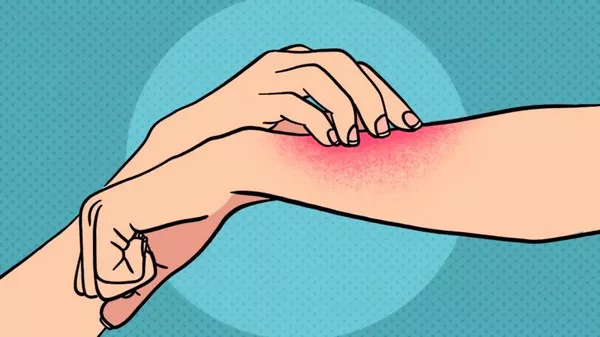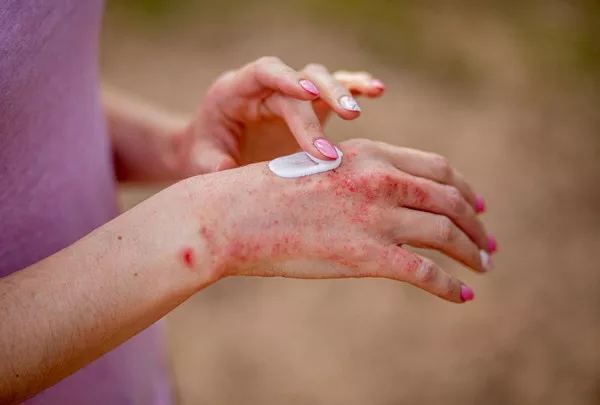Eczema, also known as atopic dermatitis, is a common skin condition that causes dry, itchy, and inflamed skin. It can affect people of all ages, but many adults are dealing with eczema for the first time or have had it since childhood. Understanding how long eczema lasts in adults depends on several factors, including the severity of the condition, triggers, and the treatment plan.
In this article, we’ll explore the details of how long eczema lasts in adults, what affects its duration, and how to manage flare-ups effectively.
What Is Eczema?
Eczema is a chronic skin condition characterized by patches of dry, red, and itchy skin. It can appear anywhere on the body, but it’s most commonly found on the face, neck, hands, and the backs of the knees. Eczema is not contagious, but it can cause significant discomfort and affect a person’s quality of life.
Types of Eczema in Adults
There are several types of eczema that can affect adults:
Atopic Dermatitis: This is the most common type of eczema, typically associated with allergies and asthma.
Contact Dermatitis: This occurs when the skin reacts to irritants or allergens like soap, detergents, or certain metals.
Dyshidrotic Eczema: Small, itchy blisters form on the hands and feet.
Nummular Eczema: Coin-shaped patches of irritated skin that are common in adults.
Seborrheic Dermatitis: This mainly affects oily areas of the skin like the scalp, face, and chest.
Each type of eczema can last for different periods, depending on how it is managed and the individual’s overall health.
SEE ALSO: What is in Aveeno Eczema Cream?
How Long Does Eczema Last in Adults?
Eczema Flare-Ups Can Be Temporary or Chronic
For some adults, eczema may last for a few weeks to a few months before going away completely. For others, it is a lifelong condition that comes and goes, triggered by environmental factors, stress, or other underlying health conditions. Eczema can last anywhere from several days to a lifetime, depending on the individual case.
The duration of eczema varies greatly, but there are two main patterns of how long it lasts:
Acute Flare-Ups: These are short-term episodes that last a few days to weeks. Acute flare-ups often occur due to exposure to allergens or irritants, and with proper treatment, the symptoms can clear up relatively quickly.
Chronic Eczema: Some adults experience eczema as a chronic condition, meaning it persists for months or even years. In this case, the eczema may never fully go away, but symptoms can be managed with treatment.
Factors That Influence How Long Eczema Lasts
Several factors affect how long eczema lasts in adults:
Severity of the Condition: Mild eczema might clear up in a matter of weeks, while severe eczema can last much longer and may require ongoing treatment.
Treatment: Eczema that is treated early and effectively often resolves faster. Without proper treatment, the condition can become more persistent and harder to manage.
Triggers: Eczema flare-ups are often triggered by external factors such as stress, allergens, or irritants. Identifying and avoiding these triggers can reduce the frequency and duration of flare-ups.
Skin Care Routine: A consistent skin care routine that includes moisturizing and avoiding harsh products can help manage eczema and shorten its duration.
Overall Health: Adults with other health conditions, particularly immune-related issues, may experience longer-lasting eczema due to the body’s inability to heal properly.
Managing Eczema Flare-Ups
How to Treat Eczema Flare-Ups Quickly
Although there is no cure for eczema, there are several treatments available that can help manage symptoms and reduce the duration of flare-ups. These include:
Moisturizers: Keeping the skin hydrated is one of the most important steps in managing eczema. Use a thick, fragrance-free moisturizer several times a day, especially after bathing.
Topical Steroids: Corticosteroid creams and ointments are often prescribed to reduce inflammation and itchiness during flare-ups.
Antihistamines: These can help reduce itching, especially at night when eczema symptoms often worsen.
Prescription Medications: In more severe cases, doctors may prescribe oral corticosteroids or immunosuppressants to control symptoms.
Wet Dressings: In cases of severe eczema, applying a wet bandage over medicated skin can help soothe the skin and reduce inflammation.
Avoiding Triggers to Prevent Long-Lasting Eczema
Identifying and avoiding triggers is key to managing eczema. Some common triggers include:
Soaps and Detergents: Use mild, fragrance-free products to avoid irritating the skin.
Stress: Stress can worsen eczema, so practicing stress-reduction techniques like meditation or yoga may help.
Environmental Factors: Dry air, extreme temperatures, and allergens like dust or pet dander can trigger eczema. Using a humidifier in dry environments and keeping your home clean can help reduce flare-ups.
When Does Eczema Become Chronic?
Signs That Eczema Is Becoming Chronic
Eczema is considered chronic if it persists for six months or longer, or if flare-ups occur frequently. Chronic eczema can lead to complications such as:
Thickened Skin: Constant scratching can lead to a condition called lichenification, where the skin becomes thick and leathery.
Infections: Open wounds from scratching can become infected, which may require antibiotic treatment.
Emotional Stress: Living with long-term eczema can lead to emotional stress, anxiety, and depression.
If eczema is not managed properly, it can become a chronic issue that impacts your daily life. It’s important to work with a healthcare professional to develop a long-term treatment plan to prevent eczema from becoming more severe.
Long-Term Management for Chronic Eczema
Chronic eczema requires a proactive approach to prevent flare-ups and reduce symptoms. Here are some strategies for managing eczema in the long term:
Follow a Consistent Skin Care Routine: Moisturize regularly, avoid hot showers, and use gentle cleansers to prevent skin irritation.
Use Prescription Medications as Needed: If over-the-counter treatments aren’t enough, a doctor may prescribe stronger medications to manage chronic eczema.
Identify and Avoid Triggers: Keep a journal of flare-ups to identify patterns and avoid triggers.
Consider Light Therapy: In some cases, ultraviolet (UV) light therapy may be recommended to reduce inflammation and improve skin health.
Seek Emotional Support: Living with chronic eczema can be emotionally challenging. Support groups or counseling may help you cope with the stress of managing a long-term condition.
When to See a Doctor
When Eczema Won’t Go Away
If you’ve been experiencing eczema symptoms for more than a few weeks and over-the-counter treatments aren’t helping, it’s time to see a doctor. A dermatologist can assess your condition and recommend stronger treatments to help manage symptoms.
Other reasons to see a doctor include:
Severe Itching: If the itching becomes unbearable, a prescription medication may be necessary.
Signs of Infection: If the skin is red, swollen, or oozing, it could be a sign of infection, and antibiotics may be needed.
Emotional Impact: If eczema is affecting your mental health, a healthcare professional can provide guidance and support.
Conclusion
Eczema in adults can last anywhere from a few weeks to a lifetime, depending on the individual and how the condition is managed. While there is no cure for eczema, treatments are available to reduce the severity and duration of flare-ups. Identifying triggers, maintaining a good skin care routine, and working closely with a healthcare provider can help manage eczema effectively.
The key to managing eczema is understanding your triggers and taking steps to avoid them. With the right treatment plan, most people can control their symptoms and lead a comfortable life, even with chronic eczema.
Related topics:

























